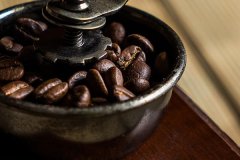Drink coffee healthily | how long is it appropriate to drink tea or coffee after a meal?

For professional baristas, please follow the coffee workshop (Wechat official account cafe_style)
How long is it appropriate to drink tea or coffee after a meal? Some people say that caffeine will affect protein absorption, and drinking tea after a meal will also produce toxins, which makes people feel alarmed. What on earth is going on? Let the dietitian answer it!
Caffeine can increase gastric juice secretion, drink the right amount after meals, and help the digestive system operate.
Many people like to drink a cup of tea or coffee after meals, but it is spread on the Internet that caffeine will affect protein absorption, and even produce toxins after meals, making people at a loss as to what to do. Chen Yanhua, a dietitian at Changhua Christian Hospital, pointed out that caffeine can increase gastric juice secretion and drink moderate amounts after meals, which is conducive to the operation of the digestive system, but daily caffeine intake is best controlled within 300 mg. In addition, the tannic acid contained in tea will combine with protein to form "tannic acid protein" and coagulate and precipitate, resulting in symptoms such as difficulty in digestion and gastrointestinal discomfort, but it is not poisoning. It is recommended to drink tea at intervals after meals to reduce gastrointestinal load.
"Daily caffeine intake in 300mg"
Nutritionist Chen Yanhua points out that caffeine has many functions, one of which is to stimulate the sympathetic nerve and increase gastric juice secretion, so drinking a moderate amount of caffeine after a meal is helpful to the operation of the digestive system, and you don't have to wait for an hour after a meal to drink it. As for how much caffeine is "the right amount"? According to the recommendation of the Department of Health, caffeine intake per person should be limited to less than 300 mg per day, in the case of American coffee, per 100 c.c. It contains about 200 milligrams of caffeine, and for adults weighing 60 kilograms, a cup of black coffee exceeds the standard.
As for the saying that drinking tea after a meal will produce toxins that lead to poisoning, Chen dietitian pointed out that tea contains tannic acid (tannin, tannin), which is a polyphenolic substance, which is a strong antioxidant, so it tastes astringent, because when eating, protein foods are often eaten, and the two combine into "tannic acid proteins" and coagulate and precipitate, resulting in symptoms such as difficult digestion and gastrointestinal discomfort, but not poisoning.
"tannic acid and protein avoid eating together."
She said that tannins are common in foods. Besides tea, guava, grapes, Hawthorns and persimmons are also rich in tannins. It is recommended to separate them from protein-rich foods such as eggs, seafood, dairy products and bean products to avoid indigestion.
Chen dietitian said that some ingredients in tea are affected by brewing mode, long-term storage after brewing, concentration, intake and time, and physical condition and other factors. generally speaking, the content of tea tannic acid drunk during meals does not affect protein and digestion, but after drinking tea, the food absorbs water and expands, which is easy to make people feel full and think it takes longer to digest. In fact, there is no difference in time. It takes about 4 hours from the time the food is eaten to the time it is not completely emptied.
Important Notice :
前街咖啡 FrontStreet Coffee has moved to new addredd:
FrontStreet Coffee Address: 315,Donghua East Road,GuangZhou
Tel:020 38364473
- Prev

Healthy Coffee drinking | three steps to identify good or bad coffee beans
Professional barista communication Please pay attention to the coffee workshop (Wechat official account cafe_style) Coffee is a daily drink for many people, but did you drink it right? How to distinguish fresh coffee beans, teach you from the color appearance and taste of coffee beans good or bad. After the coffee beans are bought back, they also have some knowledge about how to preserve them. Coffee beans. Coffee beans. Characterization of good beans: ripe enough,
- Next

"Fine Coffee Entrepreneurship" intellectual coffee, you deserve one-on-one thoughtful treatment.
Professional baristas Communication Please pay attention to Coffee Workshop (Wechat official account cafe_style) Coffee has been introduced into people's daily life for more than a century, and today it has ushered in the third wave of coffee revolution. The third wave of coffee revolution belongs to the world of boutique coffee, from planting, processing to brewing, all processes have to pursue the highest quality. Although the number of intellectual coffee shops is small, it is beyond imagination.
Related
- Unexpected! Ruixing Telunsu lattes use a smoothie machine to foam milk?!
- % Arabia's first store in Henan opens into the village?! Netizen: Thought it was P's
- Does an authentic standard mocha coffee recipe use chocolate sauce or powder? Mocha Latte/Dirty Coffee/Salty Mocha Coffee Recipe Share!
- What is the difference between Vietnam egg coffee and Norway egg coffee? Hand-brewed single product coffee filter paper filter cloth filter flat solution!
- What is the difference between sun-cured and honey-treated coffee? What are the differences in the flavor characteristics of sun-honey coffee?
- How to make Italian latte! How much milk does a standard latte use/what should the ratio of coffee to milk be?
- How to make butter American/butter latte/butter Dirty coffee? Is hand-brewed coffee good with butter?
- Is Dirty the cold version of Australian White? What is the difference between dirty coffee/decent coffee and Australian white espresso?
- Relationship between brewing time and coffee extraction parameters How to make the brewing time fall to 2 minutes?
- Got entangled?! Lucky opens a new store, Mixue Ice City, and pursues it as a neighbor!

